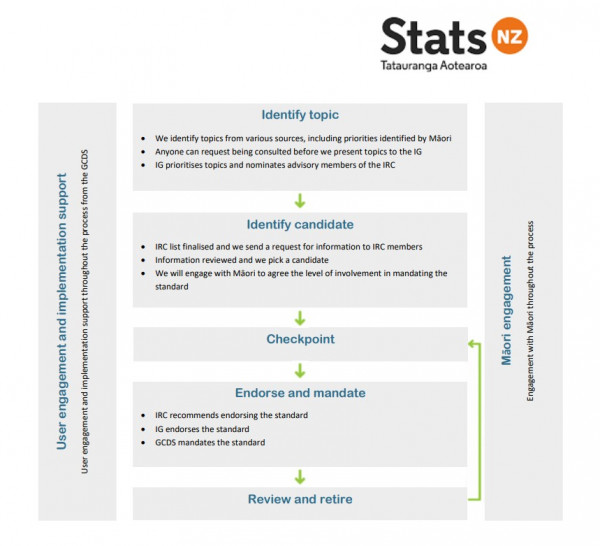This page outlines the process for mandating data standards, including the groups involved in mandating standards, the proposed topics and candidates, how you can engage with the process, why it was changed, and compliance with the previous standards.
The mandating process is separate to any technical review of the base standards.
An important part of the mandating process is helping government agencies adopt the standards.
The steps in the process are:
The data system leaders in the Information Group (IG) identify and prioritise topics for standardisation.
Stats NZ requests information from the Mandated Standards Implementation and Review Committee (IRC). This information determines which standard to mandate. From then on, Stats NZ refers to the selected standard as a 'candidate'. Stats NZ will engage with Māori to agree the level of involvement in mandating the standard.
In a separate process, the technical content of the base standard is reviewed and further engagement is conducted if needed. If further work is needed, Stats NZ will engage with Māori to agree the level of involvement in developing the standard.
The IRC recommends the standard to be endorsed for mandate. The IG endorse the standard and the Government Chief Data Steward (GCDS) mandates the standard.
Stats NZ completes an evaluation of their engagement with Māori during the process. After one year, Stats NZ reports the implementation progress to the IG. Stats NZ performs scheduled reviews of the suitability, and retires mandated standards if needed.

The IG is a cross-agency group chaired by data system leaders in the Public Service. The group aims to increase the effectiveness of the Public Service by strengthening the leadership of the government data system.
Their role in this process is to think about whether a standard should be mandated across Public Service Departments and Departmental Agencies from a system perspective. The GCDS considers the views of the IG when deciding whether to mandate a standard.
The Information Group
The IG’s terms of reference
The IRC is a sub-group of the IG which has both core and advisory members.
Core members are representatives from the Public Service Departments and Departmental Agencies who must adopt the standard. They have two roles:
Advisory membership is by invitation. Advisory members think about the impact that a mandated standard will have on the organisation or group they represent.
The IG considers the views of the organisations represented in the IRC before deciding to endorse a standard.
Mandated Standards Implementation and Review Committee
IRC terms of reference [PDF 87KB]
Currently there are 4 mandated standards. These are:
For more information, have a look at the Register of mandated data standards, and for help with implementing these standards, contact MandatedStandards@stats.govt.nz.
Register of mandated data standards
The current topics identified by the data system leaders in the IG to be mandated standards are:
After careful consideration, the current candidates (standards) chosen to be considered for mandate and use across the Public Service are:
Stats NZ believes that time and effort spent on assessing the implementation, impacts, and usability of candidates is a good investment for agencies, given they are likely to become mandated in future.
The Standards team at Stats NZ is currently reviewing the Statistical standard for ethnicity. Once the review is complete, which is currently planned for mid-late 2023, the standard will progress to the endorse and mandate phase of the mandated standards process. Additionally, the name will change to Data standard for ethnicity to reflect the broader purpose of the standard.
The current version of the ethnicity standard is available on Ariā.
Statistical standard for ethnicity
Stats NZ has decided to delay the endorse and mandate phase of the mandated standards process for the Data standard for Māori business. This is because this is a newly developed standard, and we recognise the need to socialise it and understand the impact on users and stakeholders before it is mandated.
Despite not yet being a mandated standard, Stats NZ encourages agencies to adopt the Data standard for Māori business. If you would like support, please contact MandatedStandards@stats.govt.nz.
The standard is available on the Stats NZ website.
Data standard for Māori business
The Standards team at Stats NZ is currently reviewing the Statistical standards for Māori descent and iwi and iwi related groups. Once the review is complete, which is currently planned for mid-late 2023, the standards (or standard) will progress to the endorse and mandate phase of the mandated standards process. Additionally, it’s likely that the name(s) will change from statistical standards to data standards to reflect the broader purpose of the standards.
The current versions of the Māori descent and iwi and iwi related groups standards are available on Ariā.
Statistical standard for Māori descent
Statistical standard for iwi and iwi related groups
Stats NZ works with people across government to design, develop, and implement mandated standards. During this process, there are many opportunities for you to engage. You can:
Mandated standards used to be called data content requirements, or DCRs. When Stats NZ assessed the process for the first 3 mandated standards (date of birth, person name, and street address), we noticed that it was difficult for government organisations to implement the standards.
The new process aims to resolve this issue and improve efficiency by working with organisations to encourage engagement and support implementation. It is also streamlined, with fewer layers of decision making.
Yes. Although the process has changed, Public Service Departments and Departmental Agencies still need to comply with the first 3 mandated data standards (previously known as data content requirements or DCRs). Other organisations or groups don't have to meet the standards, but it is recommended as best practice.
If you are unsure whether the mandate applies to your organisation, or want help implementing mandated standards, email MandatedStandards@stats.govt.nz.
If you’d like more information, have a question, or want to provide feedback on this page, email MandatedStandards@stats.govt.nz.
Content last reviewed 26 October 2022.